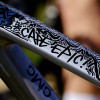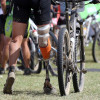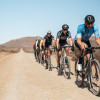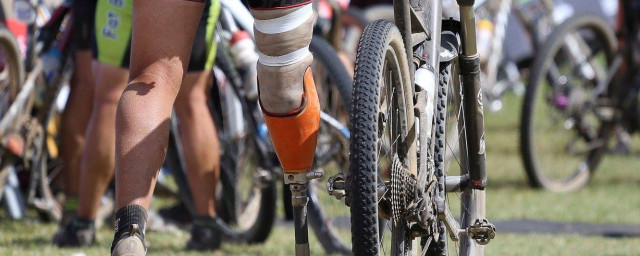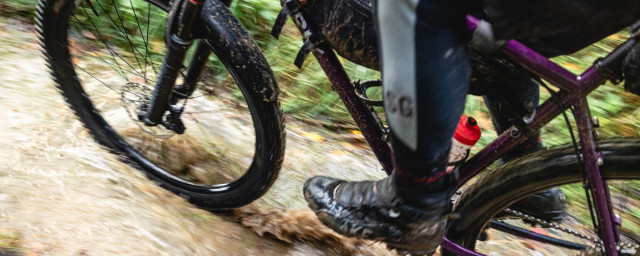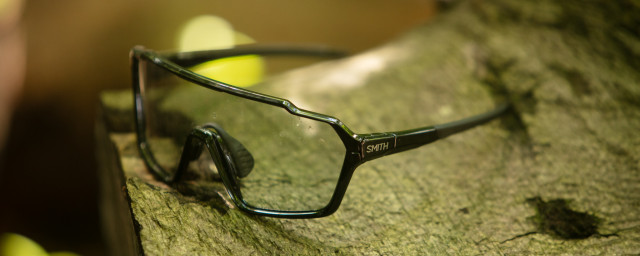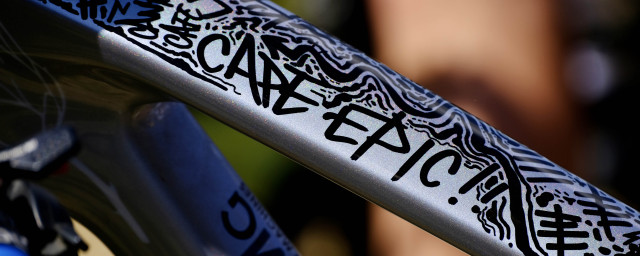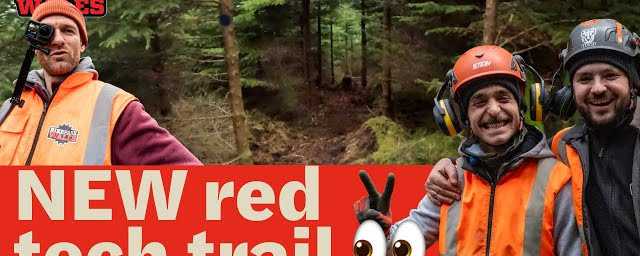On and off the record with Kevin Vermaak - Cape Epic founder
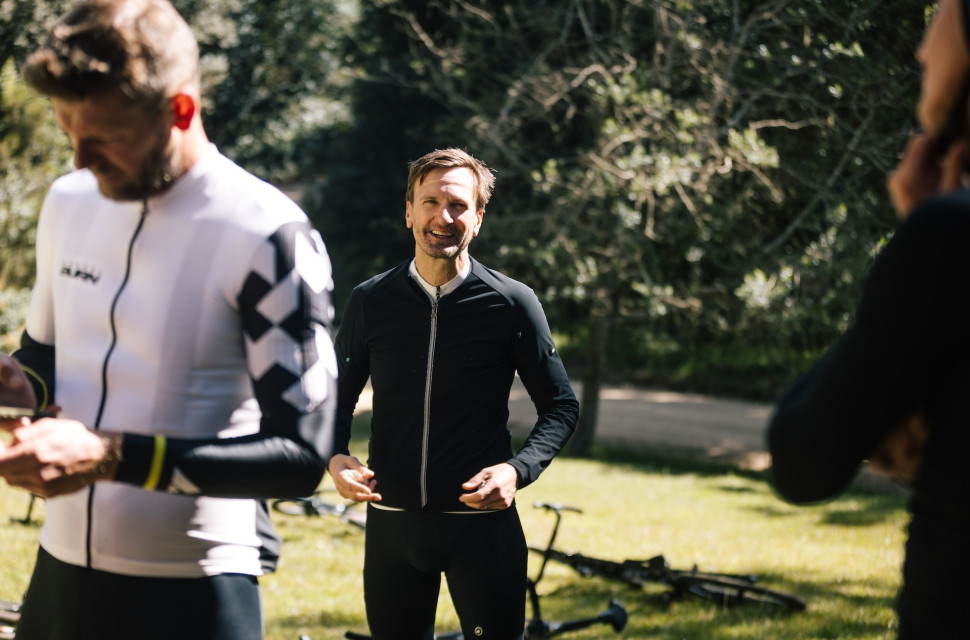
[Words by Steve Thomas - Photography courtesy of Gravel Burn]
When he launched the Cape Epic, south African mountain biker, Kevin Vermaak, turned his hazy and semi-feasible dream into reality in 2004. This wild and bold ride through his homeland was set to become the world's greatest mountain bike stage race - the Tour de France for those who play dirty.
- 2025 Absa Cape Epic - everything you need to know
- 10 reasons why you need to ride the SPAR Swiss Epic
- 2024 Specialized Epic Comp first ride review
Back in 2016, he sold the race to Ironman and, when something is such an impassioned and integral part of you, that can be tough. Now Kevin is back and chasing another dream, in creating what he believes, and what we suspect, will soon become one of the greatest gravel bike stage races around – Gravel Burn.
The 850km weeklong race in late October 2025 will take in some of the Cape’s most amazing trails and pass through epic scenery along its way, and we have a hunch that this is going to be one very special race. Entries open on 3 December 2024, and you will need to be fast if you want to bag a slot at www.gravel-burn.com.
We caught up with Kevin to dish the dirt on his new race.
Off.road.cc: What have you been up to since leaving the Cape Epic?
Kevin Vermaak: My restraint of trade contract with Ironman (I sold the Cape Epic to them) ended on 30 June this year. Since then, I’ve thrown myself into creating the Gravel Burn. I had the idea for it earlier this year when I saw that guys in Cape Town training for the Cape Epic were actually doing most of their riding on gravel bikes, and not mountain bikes. I then had a good look at the gravel bike scene and thought it had great potential.
ORCC: When you started Cape Epic, it was the first major MTB stage race in Africa and became the biggest in the world. Did you ever anticipate that it would become so successful, and how do you see it impacting the sport overall?
KV: Well, our goal from the very beginning at the Cape Epic was actually to be the foremost mountain bike stage race in the world, although we didn’t shout it too loudly! In fact, that goal was on the first slide in the PowerPoint presentation that I used at the very first crew workshop a few months before the original Cape Epic. It said that our goal, as in the team behind the Cape Epic, was to become the world’s premier MTB stage race.
At the time there were really only four MTB stage races in the world, and in the 24 months before the first Cape Epic I’d personally participated in the two that were said to be the best. I was pretty sure that we could organise a better event (I had not organised a race before, but I’d worked on and executed large and complex projects). So, it wasn’t really such a big goal to start with – more of an opportunity, I think. And then, once we got going, our goals shifted towards growth and innovation - not just filling a race with riders (which, by the way, we achieved quite easily - the first race sold out in three days, and from then on it was effectively instantaneous).
So, then we started coming up with ideas from one year to the next, to make the race a richer product. By richer, I mean adding more elements to the race and working on how we could serve every type of rider at the race better.
Luckily, mountain bikers from around the world liked what we were creating, and they kept coming back and telling their friends. Eventually, we had this substantial waiting list of riders who wanted to experience what we’d created.
ORCC: What has the impact of the Cape Epic had on African cycling in general?
KV: Well, it’s probably easier for me to speak about South Africa than the whole of Africa. In South Africa, I think there have been two main impacts:
I think the Cape Epic has probably upped the standard of nearly all MTB races in the country - made their organisational standards higher and their general approach more professional - which has created a whole industry around these races. Folk are willing to pay for the amazing experiences dished up at these races, so there’s a business opportunity for many event organisers. In earlier years the big bike races in South Africa were typically run by charities and volunteer organisers. And the more events become professional the more professional riders they attract. South Africa must be one of the few countries where it’s more financially rewarding to be a mountain biker than a top road cyclist.
We started building trails, and then more and more landowners started building trails (with a small industry around this on its own) and now there is a mad rush to build more and more trails – we are just spoiled for choice. I don’t think there is another region in the world where there is such prolific trail-building by so many different stakeholders. The Cape Epic combines many of these trail networks for its events.
I also like to think the Cape Epic has given South Africans something to be proud of. If you chat with mountain bikers around the world you will find they all know about the Cape Epic.
ORCC: With Cape Epic, you went for the two-rider team format, although there were a couple of others around doing that, it was still unusual – why did you go with this and not solo, and how does that impact entries etc?
KV: I actually believe the two-rider team format was the secret sauce of the Cape Epic. We had to push hard to establish this format and persevere, despite resistance from many of the biggest names in professional mountain biking at the time.
Ultimately, the two-rider format for stage racing won out, and, when executed properly it really works well. We even wrote the rules for the format, and these were then adopted by the UCI for two-person team MTB racing. We obviously can’t claim to have invented the format - there were a few races before the Cape Epic that used the format using pretty basic rules – but I believe it was the Cape Epic that cemented it.
We had to address many complexities and nuances in the rules so there would be highly competitive racing. By the way, many top riders, including Nino Schurter, for example, only ride this format at the Epic, never at any other races.
Anyway, just because other gravel races don’t use the format, this was not a reason for us not to adopt the format for the Gravel Burn. It could have once again been a differentiator and USP for the Gravel Burn, but in the end, we opted for a solo format, the now well-established format for gravel racing, and for three main reasons:
Safety: high-speed pelotons will form on the gravel roads, and you don’t want people to look around for their partners - that would be a formula for crashes.
You can include individual age-group contests, each with their own leader’s jersey. The age-group issue is complicated in teams where partners are quite often in different age brackets.
Many gravel professionals are privateers and, as such would struggle to find partners (others on a similar level could be contracted to teams).
That said, we are coming across some interesting issues that we need to resolve. For example, what is stopping a large team from coming with several riders to support a potential winner? I don’t think any of the big races have rules that cater for this, so we’re starting to wrestle with it now for our first race.
ORCC: Why exclusively drop bars? Even the biggest gravel races, like Unbound, allow all-comers with all types of bikes?
KV: The route is actually a gravel biking route. It is for off-road speed, and a classic gravel bike is the perfect bike for it. Sure, you can put gravel bars onto an MTB but that’s not perfect – it’s slow and the geometry doesn’t work. (We have tried out one of the conversions, and it’s tough going!)
And then, again, it’s about safety: Wide flat MTB bars will be a problem in a peloton and potentially cause crashes. The lines that mountain bikers take can be quite different to those chosen by gravel bikers. For example, a mountain bike can go straight over a pothole. If you are behind a mountain bike and follow that line on a gravel bike you could crash badly.
ORCC: The original Cape Epic also started in Knysna and was point-to-point to Stellenbosch, and then you changed the format to start with a prologue in Cape Town, and to spend multiple nights in one race village. Is the Gravel Burn route a throwback to the early Epic days.
KV: The Cape Epic needed to change the format for it to continue growing, and so we could accommodate bigger race villages and more technical routes. And after that change, the Cape Epic really exploded in terms of media, spectators, bigger infrastructure set-ups from all stakeholders, and commitment from towns.
And now, we at the Gravel Burn are essentially going back to the founding concept of the Cape Epic. But we’re doing it in the ‘spirit of gravel’ – I believe gravel racing is about exploration, discovery and going places, and with our eyes wide open to the challenges. We’re hoping to recreate the magic for a route that will not have many spectators, nor many supporters, since essentially, we’ll be in the middle of semi-desert Karoo.
Sure, the logistics are way more difficult but, as a team, we’re also much better now and know how to solve some of the pitfalls of the early Cape Epic model. I don’t think I could have done what we intend to do with the Gravel Burn without the vast experience that we’ve assembled for the event; I think if you add it up you will find there’s about 100 years of total Cape Epic experience in the Gravel Burn team. The lessons we learnt will be invaluable for us in 2025.
ORCC: How much is this a personal thing to you, and given the learnings from Cape Epic and after leaving it, and with the huge workload and stress that goes with it, what made you return to this?
KV: Well, for sure I would not be doing this if I did not think that right now a gravel race presents an opportunity to create something even more special than another MTB event.
For example, the number of participants you can allow on the course is not as restricted. MTB has a limit on what is enjoyable on singletrack, which quickly gets congested.
There is also a huge focus on gravel from the cycling industry now, and, frankly, there are just way more people in the world that can take on the Gravel Burn than, say, the Cape Epic. The Epic has become quite a technical race these days, but don’t get me wrong: I would not suggest that it should be anything else – it is the rite of passage for serious mountain bikers.
And sure, there’s a lot of work to do but also a lot of fun to be had. I love working with people I have come to trust and respect over the years, and I know we’re a good team. I think we’ve all got a vision of what we might be able to achieve here, and that is a globally unique bike experience that we think thousands of riders from across the planet will want to experience at some point in their lives.
And we love gravel riding – it’s not just about organising the race. I think we’ve all grown to enjoy riding across the Karoo, and we now know it’s an awesome experience – we’re big fans of the efficiency and speed of gravel riding in our beautiful countryside.
ORCC: Why gravel this time?
KV: Gravel is just getting so big now, and there are some very special races out there. At the same time, South Africa has proved to be a very desirable biking destination thanks to the Cape Epic. If we can create the same interest around a very special bike adventure experience, I'm sure people will want to travel to South Africa again. And it feels to me that there is the same gap in the market for a gravel stage race as existed for MTB when we launched the Cape Epic.
Gravel has also proved to be an enduring format, it’s not a fad like fat bikes were. What we created in the Cape Epic has paved the way (please excuse the pun) for a gravel stage race. People trust us, and the country as a destination, to deliver premium bike races that might cost them ridiculous amounts elsewhere.
By the way, I don’t see this as competing with the Cape Epic, nor do I want it to – I still love that event and hope it continues growing.
And finally, personally, it’s about creating a business. I actually think there are some fundamentals about the format of the race we’re creating that make this a big opportunity.
ORCC: How similar in format and terrain will the race be compared to early Cape Epic races?
KV: Actually, quite different. We’re going to an area of South Africa that is very different and is broadly going East from Knysna instead of West. It’s also something very new and different for South African riders. There are very few races in the areas that the Gravel Burn is going to traverse, and it goes through a largely unpopulated area of the country. Anyone who knows this part of the Karoo will tell you it is beautiful and how ‘undersold’ it is. Now, hopefully, a few thousand gravel riders will be telling the rest of the world about its beauty.
ORCC: With Cape Epic being so prominent in SA, how tough has it been to get support for Gravel Burn?
KV: My personal brand is still very much associated with creating the Cape Epic and its success, so we are getting great support from riders, the cycling industry and corporate sponsors that don’t want to miss out on ‘The Next Big Thing’. I also believe that there is a symbiotic relationship with the Cape Epic – that a rising tide will lift all boats and SA will be even more attractive as a bike racing destination.
ORCC: There are now a number of gravel races and off-road stage races throughout Africa – some inspired by the Cape Epic, some by the boom of gravel and African riders going to Europe, where do you see Gravel Burn finding its place in the region, and globally?
KV: We like to think we’re not just organising a new event. Just like with the Cape Epic, we’re building a sports event brand with the Gravel Burn. I’ve looked under the hood of many, many other events and we have a different approach to what I saw there.
We’re essentially embarking on a large-scale project, with what I believe to be loads of potential. I think our budget will be equal to the biggest off-road bike races in the world within a few years and I don’t see that happening to any other gravel events in Africa at the moment.
ORCC: With the UCI Road World Championships happening in Africa next year, and with the numbers of African road races, in particular, making the top level, not to mention Alan Hatherly winning the world champs, what is your assessment of the current standing and direction of African racing and how it's grown since that first Epic?
KV: It is very heartening. South Africans Alan Hatherly, Matt Beers and Candice Lill are right up there with the best in the world. As you know, Matt and Candice have been stars at the Epic. I like to think that their desire and determination to do well has been shaped in part by the spotlight that the Cape Epic put on mountain biking.
In turn, I think that their success is encouraging a whole new generation of mountain bikers: there are certainly some very, very promising young South Africans coming through the ranks. It was also heartening to see Eritrea’s Biniam Girmay make history at the 2024 Tour de France by becoming the first Black African to win a stage of the race: I am sure he will inspire many others.

